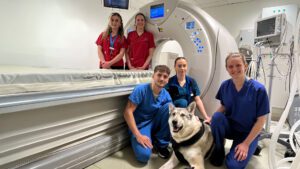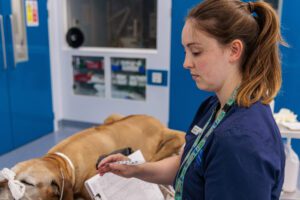Objective
To evaluate clinical outcome of dogs with appendicular osteosarcoma (OSA) treated with stereotactic radiosurgery (SRS) and subsequent internal fixation of a pathologic fracture.
Study design
Retrospective case series.
Animals
Dogs with spontaneous-occurring appendicular OSA (n = 6).
Methods
Medical records (May 2002–January 2008) of dogs that had SRS for appendicular OSA were reviewed. Dogs were included if they had a pathologic fracture either before or after SRS and were treated with internal fixation. Signalment, history, physical examination findings, clinicopathologic data, diagnostic imaging findings, biopsy results, surgical complications, number of surgeries, adjuvant therapy, development of metastatic disease and cause of death were recorded.
Results
Six dogs met the inclusion criteria. Two dogs had a pathologic fracture at admission and 4 dogs developed a fracture after SRS with a mean ± SD time to fracture development of 6.25 ± 1.65 months. The first 3 fractures were repaired using an open approach and the latter three using minimally invasive percutaneous osteosynthesis (MIPO). Infection occurred in 5 dogs and implant failure in 3. Limb function was subjectively assessed as good in all dogs when the implants were stable and infections were subclinical. Survival times ranged from 364–897 days; 1 dog was lost to follow-up.
Conclusion
Fracture repair using internal fixation should be considered a viable limb-sparing alternative for pathologic fractures that have been treated with SRS.











